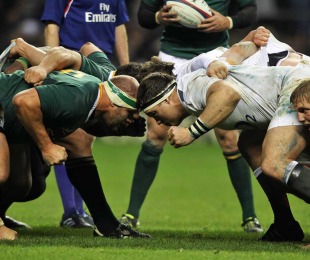|
Comment
The most hated words in rugby
John Taylor
December 8, 2010

England and South Africa pack down during their clash at Twickenham last month
© Getty Images
Enlarge
'Crouch, Touch, Pause, Engage' are fast becoming the most hated words in rugby. In my column 'Scrums are a blight on the game' last April I highlighted what I consider to be overwhelming evidence that the scrum protocol introduced by the IRB in 2007 is not working. I quoted statistics from last year's autumn internationals where in one weekend of matches between most of the world's top teams there were 98 scrums of which 64 had to be reset, seven ended in free kicks and seven in full penalties. Thus 80% of scrums failed to fulfil their purpose - 'to restart play, safely and fairly after a minor infringement or stoppage' - as spelt out in the law book. There was no improvement in the Six Nations and although the statistics were better in the Tri-Nations because the southern hemisphere countries tend to place less emphasis on the scrums the story from the November matches this year could be even more dire. In one game, England v Australia, there was not one conclusive scrum. That has to be a first and should have set the alarm bells ringing throughout the rugby world. There were only eight scrums in the whole match - nothing wrong with that - but every one of them ended in a penalty or a free kick so scrummaging, one of the traditional features of Rugby Union, a cornerstone of the game that helps define its character, was completely eliminated as a skill. If that trend is allowed to continue teams such as Australia might be tempted to abandon the idea of specialist props altogether. They could play three blind-side flankers in the front row and exponentially increase their dynamic power and mobility. OK, so they would sacrifice a few free kicks and the odd penalty but that could be deemed a small price to pay unless referees are going to insist on properly supervising the scrum and are prepared to bin players who are not prepared to engage. The 'crouch, touch, pause, engage' sequence was introduced partly as a safety measure and partly to make that engagement cleaner but it has become a complete farce. Paddy O'Brien, the man in charge of refereeing word-wide, seems to believe it is all a question of timing and that the key to everything is getting a real pause between the touch and engage He is living in a dream world. First, the touch, which is supposed to ensure the two props are close enough, has become a sort of boxing jab - you literally punch your opponents shoulder and then quickly withdraw - which does nothing to stop props trying to gain an advantage by going for a big hit on engagement. Second, the pause still varies hugely from referee to referee. Having gone through a stage where it was barely acknowledged we have now gone totally the other way - some officials are holding it so long you know somebody is going to jump the gun.
When they do the referee invariably awards a free kick for early engagement - not much of a punishment if you are the defending side and are almost certainly going to lose possession in any case. I believe some teams are already using this tactic deliberately at club and international level. Yet many officials seem only too eager to use that as a get out - for them the scrum has become a troublesome nuisance so good scrummaging sides are being denied the right to exploit an important weapon. If we are not going to lose scrummaging as an important part of the game the referee has to be told he has a duty to create a stable scrum rather than being able to opt out by penalising sides. Persistent offenders should be given yellow and red card sanctions which would mean every side has to invest in proper props. Nearly all engagement problems revolve around the initial hit and the IRB protocol was designed to eliminate any advantage at that stage but technical experts such as Phil Keith-Roach are adamant it has done the opposite. The law still says you are not allowed to push until the ball is put-in but that is totally ignored so the solution, without any law change, is very simple. If the referee brings the front rows closer together before initiating the engagement process there will be no room for the hit. This will eliminate the 'touch' command but anything that simplifies the instructions and ensures there is a future for props in rugby is worth trying. Overall, the game is in good shape. It was a superb autumn series with everybody - except perhaps Wales - counting a few plusses but I would hate to see scrummaging sidelined at next year's World Cup and there is a real danger of that happening unless the IRB redefines its priorities. A change of emphasis at the breakdown transformed the game last Spring - let's do the same for the scrum before it is too late. © ESPN Sports Media Ltd.
| |||||||||||||||
Live Sports
Communication error please reload the page.
-
Football
-
Cricket
-
Rugby
-
- Days
- Hrs
- Mins
- Secs
F1 - Abu Dhabi GP
Abu Dhabi Grand Prix December 11-131. Max Verstappen ()
2. Valtteri Bottas (Mercedes)
3. Lewis Hamilton (Mercedes)
4. Alexander Albon ()
5. Lando Norris ()
6. Carlos Sainz Jr ()
-
ESPNOtherLive >>
Snooker - China Open
Tennis - Miami Open

